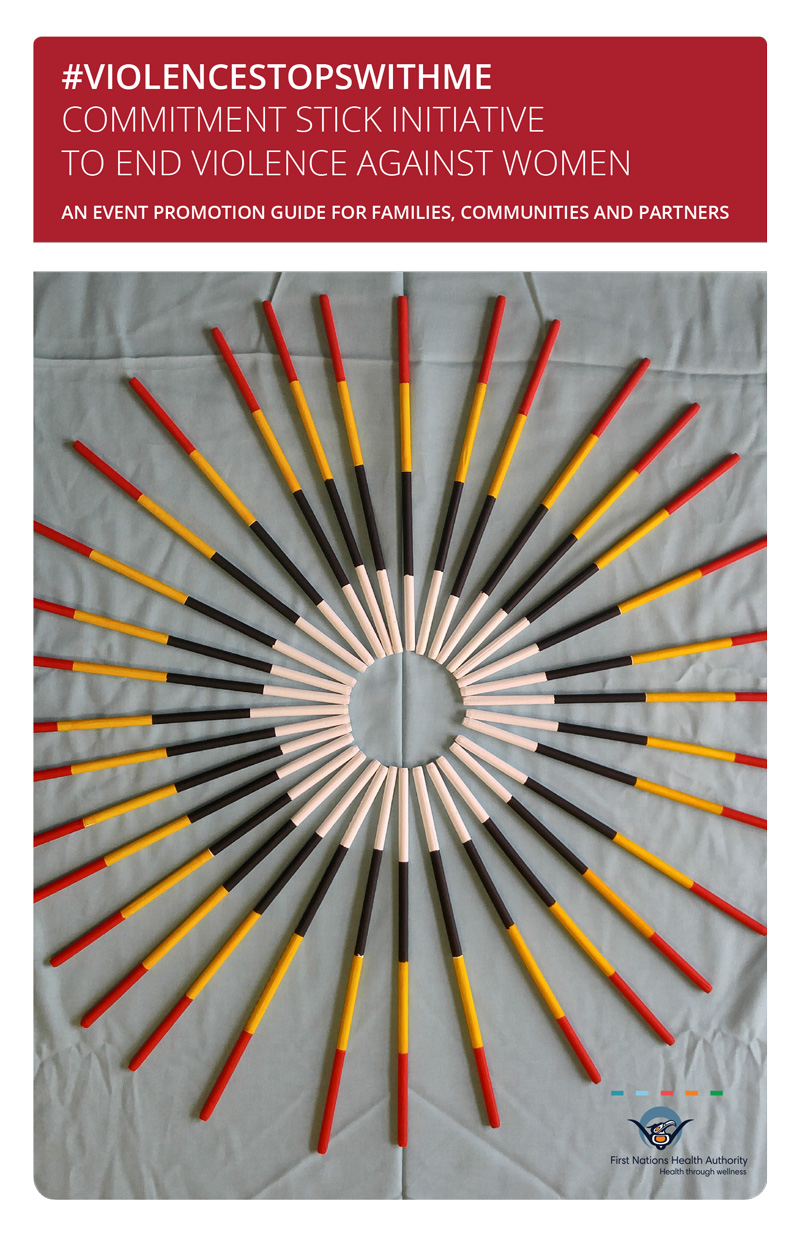
#Violencestopswithme: BC First Nations Commit to Ending Violence against Women and Girls
Attention all Chiefs attending Gathering Wisdom for a Shared Journey - Please bring your commitment sticks for use in ceremony during Nov 30th dinner.
COAST SALISH AND ESK'ETEMC TERRITORY – On the International Day for the Elimination of Violence against Women, First Nations Health Authority (FNHA) announces support for an anti-violence initiative aimed at promoting health and well-being in BC First Nations communities.
Esk'etemc's (Alkali Lake) Commitment Stick initiative is focused on ending violence against women and girls and premised on the idea that First Nations must be involved in their own healing. FNHA will provide $1000 event grants to support any First Nation prepared to tackle this issue at home.
"Violence against Indigenous women and girls is not just an issue now that it's before the media and the public—it's been there all of our lives," said Chief Charlene Belleau of Esk'etemc. "The government and the police have their programs, policies and procedures, but at the end of the day, violence against our women is also a community responsibility. It's not a matter of bringing in 'experts' who can fix the community; it's about us looking inside, looking to our culture and traditions to help us."
In May 2015 at Gathering Wisdom VII, 120 Chiefs and leaders adopted Esk'etemc's Commitment Sticks, pledging to end violence against women and girls. Esk'etemc Commitment Sticks represent a spiritual and symbolic commitment to live free of violence and to respect women and girls.
"FNHA leadership has picked up the commitment stick. We commit to zero tolerance for violence against women in the workplace, client service locations or between employees and clients," said FNHA Chief Executive Officer Joe Gallagher. "Despite policies, legislation and various safety initiatives, we all must recognize that we still have a way to go—as families, as communities, in our organizations and as a country. As a First Nations' health and wellness organization, we have a responsibility to confront violence and prevent it from happening at all of our health care locations."
The First Nations Health Directors Association (FNHDA) champions Lateral Kindness as a solution to the problem of lateral violence, which may manifest as bullying, harassment and other negative behaviours. The FNHA commits to promoting Lateral Kindness, including empathy and humility, at FNHA through our operating principles, policies and practices and in our work with First Nations communities.
"As an association that is 90 per cent female, the FNHDA supports the Commitment Stick Initiative and expanding awareness towards ending violence against women and girls in First Nations communities," said Kim Brooks, President of the FNHDA. "It is up to us to create safe spaces in our homes, communities and organizations with zero tolerance on this issue."
Violence against women is not just a women's issue. Men must be allies and uphold women's rights and safety, women must support other women, and all must commit to not be passive bystanders, but to instead be proactive in addressing this important issue.
"The first job of a warrior is to make sure the children are safe. The way that warriors make sure the children are safe is by making sure the mothers, grandmothers and aunties are safe," said Doug Kelly, First Nations Health Council Chair. "The way we make sure mothers, grandmothers and aunties are safe is by challenging ourselves as men to uphold that teaching. Today I ask our brothers, cousins, nephews and uncles to join me in reclaiming our roles as warriors."
For more information on the Commitment Stick initiative and to get involved and find out how you can share this information through your networks, visit the FNHA website at: www.fnha.ca/commitmentstick.

If you, or a loved one, are facing violence, please contact the KUU-US crisis line 1-800-KUU-US17 (588-8717) or VictimLinkBC 1-800-563-0808 to access support.
Media Contacts:
Esk'etemc Kukpi7 (Chief) Charlene Belleau
250-305-8784
FNHA Media
604-831-4898
media@fnha.ca

